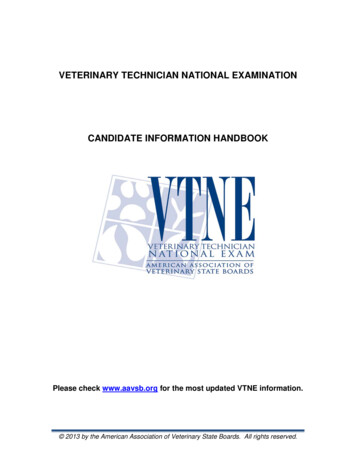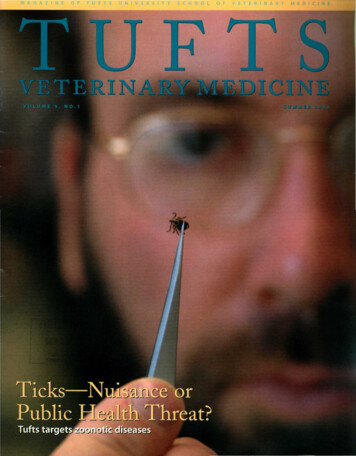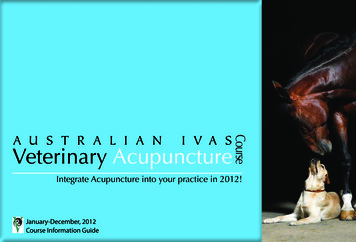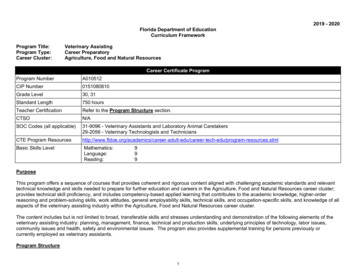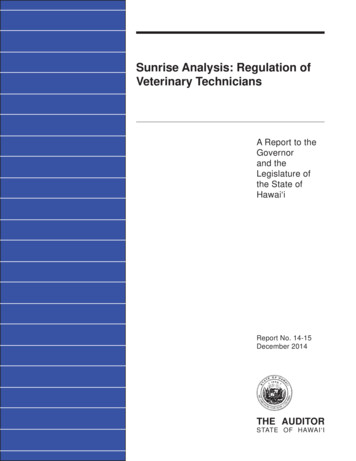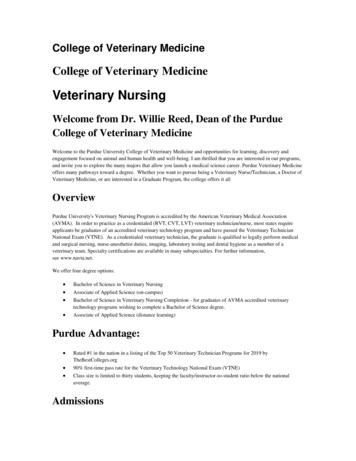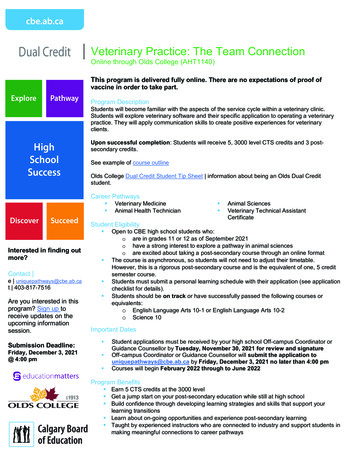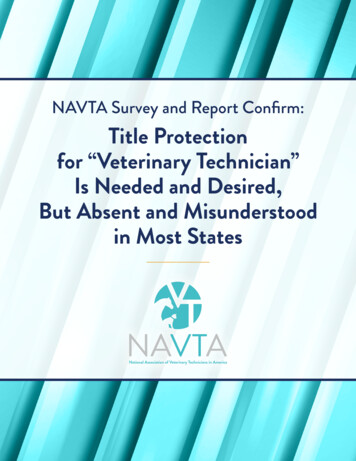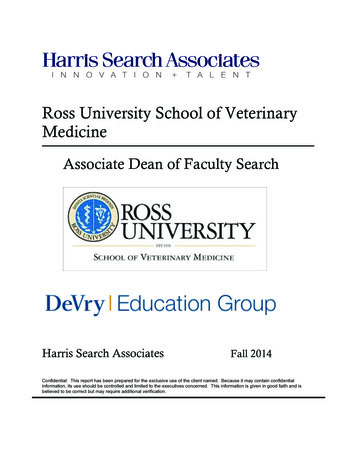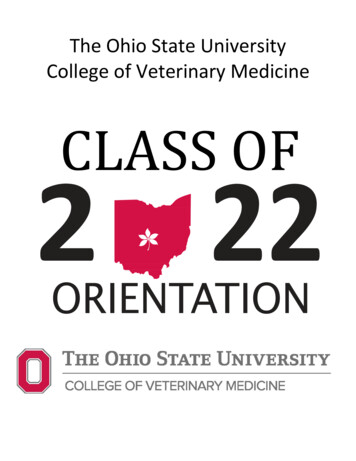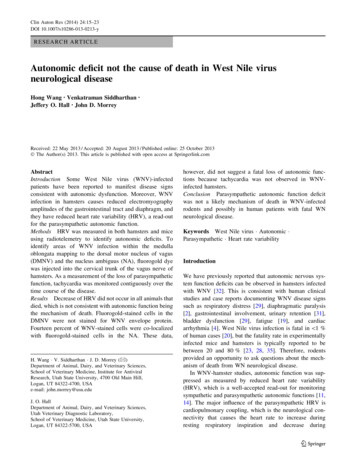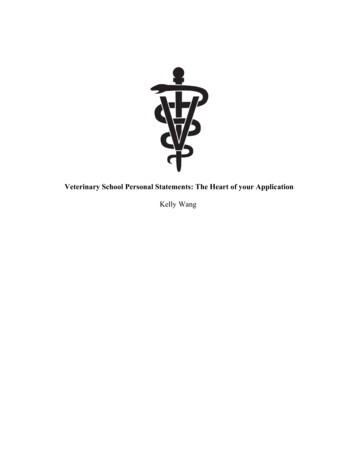
Transcription
Veterinary School Personal Statements: The Heart of your ApplicationKelly Wang
1ABSTRACTVeterinary school personal statements can be a daunting task to begin. Applicants are oftenwondering what makes a personal statement stand out, where do I begin, what do I write about,and what should I not write about. Through multiple interviews with current veterinary students,UC Davis’ Associate Dean of Admissions and Student Programs and Assistant Director ofOutreach and Admissions, this article aims to provide answers to all of these questions as well asgive further insight into what current veterinary school applicants are writing about and whatcurrent veterinary school admission boards are searching for in a personal statement.INTRODUCTIONThere is nothing worse than sitting yourself down, sifting through all your life experiences,narrowing them down to the 2-3 experiences that have impacted you the most, and trying to finda way to effectively articulate those experiences within the confines of a 300-350 word limit fora personal statement. When applying for undergraduate universities, I put all my energy andefforts into writing my personal essays since I realized that these personal statements are the onlyway my application will be “me”. Hundreds of other applicants will have the same GPA, and thesame extracurriculars, but my specific experiences and life story are what make me unique. Nowthat I am at the University of California, Davis, pursuing my bachelors degree in AnimalScience, the next milestone is veterinary school. As a third-year pre-vet student, vet schoolapplications are always looming in the back of my mind. To say the least, the veterinary schoolselection process is extremely competitive. With there being only 33 accredited colleges ofveterinary medicine in the United States, and only 2 in California (AVMA, 2021), the pressure ison for vet school applications. As an aspiring vet student, I aim to find ways to relieve thispressure. With vet school applications, come vet school personal statements. In this article, I
2intend to gather information on how to tackle writing personal statements for veterinary school,as well as what makes a personal statement stand out within this specific career field.METHODSUC Davis has been ranked the number one university for veterinary medicine in the UnitedStates for the sixth consecutive year as of 2020 (Wood, 2020), as well as the top university forveterinary medicine globally in 2020 (Easley, 2020). To get further insight into how a topuniversity reviews applications holistically, I interviewed Karl Jandrey, the Associate Dean ofAdmissions and Student Programs at UC Davis, and Lena Al-Rayess, the Assistant Director ofOutreach and Admissions at UC Davis, for their opinions on what makes a personal statementstand out amidst the hundreds of applicants they see every year. Additionally, I wanted toinclude the student perspective as well so I consulted Joshua Liu, a current UC Davis VeterinarySchool student, and Asal Bastani, a UC Davis fourth year committed to Long Island UniversityVeterinary School, to get a deeper understanding of what their writing process for their personalstatements consisted of. Furthermore, I conducted my secondary research through analyzingpeer-reviewed journal articles regarding veterinary school personal statements, and a healthprofessions advising website.DISCUSSIONVeterinary school admission committees generally judge a candidate’s merit based uponundergraduate grade-point averages (GPA), Graduate Record Examination (GRE) scores,interviews, veterinary related experiences, letters of recommendation, and the personalstatements (Roush et al., 2014). Although academic ability and clinical hours play a large role inveterinary school admissions, the holistic side of the application is just as important. Academicability measured through GPA and standardized test scores are actually not a good indicator for
3clinical performance, while non-cognitive scores proved as the best indicator for overallperformance in the career field (Raghavan et al., 2014). Cognitive scores will get you past thefirst round of selection, but your portfolio and personal statements are what will get you past thatsecond round and into veterinary school. The question now is how do you differentiate yourselffrom other candidates and make your personal statement stand out.What makes a personal statement stand out?From the veterinary school admissions board perspective, the board is looking for applicants whonot only have the experience and academic ability, but also the compassion and drive for thiscareer field. GPA and GRE scores aside, the admissions committee wants to see applicants whohave overcome obstacles and exhibited resilience in times of adversity. This is what aspiringveterinary students should be highlighting in their personal statements, experiences that expresstheir love and ambition for veterinary medicine. Lena Al-Rayess, the Assistant Director ofOutreach and Admissions at UC Davis, defines what a notable personal statement looks like toher:Personal statements should be just that: personal. The people reading them want to get toknow you as a human, not just an applicant. Often, students write what they thinkadmissions committees want to hear, and that’s always easy to spot. Personal statementsthat are authentic, vulnerable, and well written always stand out. Checklists and whatadmissions committees look for vary quite a bit by program. Our program (UC Davis) islooking for clearly articulated stories of the “why” students are pursuing vet med andhow that “why” connects to a greater story of the student. Often, we are looking forstudents who have overcome obstacles to get to where they are now. We want studentswho have shined academically and/or professionally despite life obstacles.
4Karl Jandrey, the Associate Dean of Admissions and Student Programs at UC Davis, has thesame sentiments when it comes to outstanding personal statements:[What makes a personal statement stand out is] A clear ability to write in an unapologeticway about the barriers and hurdles overcome on the candidates “distance traveled” to getto the application. I like to see diversity in experiences that shows how the candidatesresilience has only strengthened through these challenges to their educational path.The recurring theme between what Al-Rayess and Jandrey are looking for seems to be followingthe narrative of a candidate overcoming challenges and highlighting experiences that depict theapplicant going above and beyond to attain their goals and ambitions regarding this profession.When writing a personal statement, you should remain true to yourself and emphasize theexperiences that showcase your dedication and devotion to veterinary medicine.Where do I even begin?Narrowing down all your life experiences to the defining 2-3 moments can be difficult to say theleast. From the student perspective, Joshua Liu and Asal Bastani both agree that working on yourpersonal statements everyday and looking at your writing with fresh eyes is helpful to see whatparts flow and what parts need to be taken out. Liu shared how his writing process consisted ofhim listing out not only all the extracurriculars he had, but also what he took away from eachexperience, how each experience made him a good applicant, as well as how these experienceshave shaped his view of people, the veterinary profession, and his future goals (J. Liu, personalcommunication, February 17, 2021). This strategy is a good way to narrow down whichexperiences have impacted you the most and are worth writing about. Similarly, Bastanimentions how she listed all her experiences as bullet points and focused more on ideas that shefelt she could expand/connect to the most, as well as what she felt represented her the most (A.
5Bastani, personal communication, February 17, 2021). When it comes to writing these personalstatements, start early so you are able to fully express and elaborate on the experiences that haveshaped your goals and ambitions for your future in veterinary medicine.What Should I Write About?According to Hamilton’s Health Professions Advising website (Hamilton, 2021), some personalstatement tips for veterinary medicine include:1) Do not regurgitate experiences and other data already existing on other parts of theapplication.2) Write about your knowledge of the veterinary profession.3) Include information about who you are as a person and what diversity you might bring tothe institution.4) Include information about why you'd be a good candidate.With these 4 tips in mind, we can begin brainstorming.BMC Medical Education conducted a study that had the Ontario Veterinary College (OVC)survey an audience of licensed veterinarians, OVC students, as well as faculty and interns to rankthe characteristics they deem most important when reviewing candidates. Ethical behavior,sound judgement, communication, and critical/creative thinking were ranked as the top fourcharacteristics (Conlon et al., 2012). Veterinary school candidates should keep those fourcharacteristics in mind throughout their writing process and showcase experiences that exemplifythese characteristics.Bastani recently submitted her veterinary school applications and was able to share her personalstatements with me. Below is an excerpt from her response to the question “Consider the breadthof society which veterinarians serve. What attributes do you believe are essential to be successful
6within the veterinary profession? Of these attributes, which do you possess and how have youdemonstrated these in the past?”I believe it is essential for veterinarians to be passionate, empathetic, and effectivecommunicators in order to be successful in the profession. Passion is crucial in order toenjoy any career and is what motivates me to continue working towards my goals . . .Empathy is vital in creating a rapport with clients. My first euthanasia experience at a vetclinic involved making a clay paw print and writing a card to the clients. By providingthis sentimental gift, I saw the emotional toll this experience took on the family and thenecessity for comfort I needed to provide. I was compassionate towards the animal andclient and made them feel as comfortable as I possibly could.Bastani not only effectively identified the key characteristics deemed important to veterinarymedicine, but also found a way to integrate her own experiences that showcased herselfdisplaying these characteristics within the veterinary field (A. Bastani, personal communication,February 17, 2021). In the rest of her personal statement, Bastani continues to describeexperiences that exhibit her effective communication skills and passion for this career.What Should I Not Write About?Now that we have covered what current veterinary students have written about as well as whatthe current veterinary school admissions board is looking for, let’s talk about what they are notlooking for. When asked if there were any themes/narratives that seem overused or repetitive inpersonal statements, both Al-Rayess and Jandrey agreed that the narrative of having a life-longlove for animals and having a singular experience define their moment to their veterinary path isoverused within vet med personal statements. Al-Rayess even adds that childhood pets are notreally worth mentioning since many applicants’ first experiences caring for an animal goes back
7to their childhood pet. What Al-Rayess thinks applicants should focus on is “how that childhoodlove of animals has evolved over the years and how it has manifested itself into the very adultdecision to pursue a long and expensive degree” (L. Al-Rayess and K. Jandrey, personalcommunication, February 10, 2021). Veterinary school admissions boards seem to be looking forpotential in candidates, since passion, although important, can only take you so far. They want tosee how you have developed this passion over the years, and how this passion has given you thedrive to seek out experiences and overcome obstacles in this field.CONCLUSIONA veterinary school personal statement should be one that encompasses your core values,veterinary experience, as well as moments of persistence in the face of adversity. The hardestpart should simply be narrowing down what specific moments in your career have defined yourfuture ambitions and how have you taken steps to get closer to those goals. The rest, with thehelp of this article, should follow. Remember that ethical behavior, sound judgement,communication, and critical/creative thinking is key. With the tools and knowledge provided bythis article, you will be able to tackle your veterinary school personal statements with a betteridea of where to begin.
8ReferencesAVMA (n.d.). Accredited veterinary colleges. Retrieved March 04, 2021, rinary-collegesConlon, P., Hecker, K., & Sabatini, S. (2012). What should we be selecting for? Asystematic approach for determining which personal characteristics to assess for duringadmissions. BMC Medical Education, 12(1). doi:10.1186/1472-6920-12-105Easley, J. (2020, March 11). UC Davis Claims Top World Ranking in Veterinary Science.Retrieved February 17, 2021, from rld-ranking-veterinary-science/Hamilton. (n.d.). Personal Statement. Retrieved February 2, 2021, ns/veterinary/personal-statementvet#: :text career%20goals%20and%20objectives(n.d.). Retrieved 2021, from -my-jobRaghavan, M., Brandt, K., & Granstrom, D. (2014). AVMA-COE PROFESSIONALCOMPETENCY SCORES AND PRE-VETERINARY ADMISSIONS CRITERIA.Journal of Veterinary Medical Education, 41(3), 205-207. doi:10.3138/jvme.0514-051Roush, J. K., Rush, B. R., White, B. J., & Wilkerson, M. J. (2014). Correlation of PREVETERINARY Admissions Criteria, Intra-Professional Curriculum Measures, AVMACOE professional Competency scores, and the navle. Journal of Veterinary MedicalEducation, 41(1), 19-26. doi:10.3138/jvme.0613-087r1
9Wood, T. (2020, December 05). UC Davis ranks first in the nation in veterinary science.Retrieved February 17, 2021, from first-nation-veterinary-science
that I am at the University of California, Davis, pursuing my bachelors degree in Animal Science, the next milestone is veterinary school. As a third-year pre-vet student, vet school applications are always looming in the back of my mind. To say the least, the veterinary school selection process is extremely competitive.
